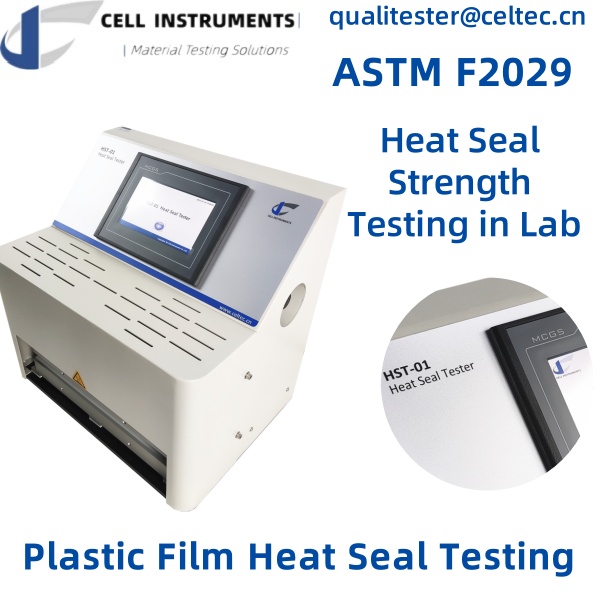Einführung
Plastic film heat seal testing is a critical procedure in industries such as packaging, medical devices, and pharmaceuticals. Ensuring that heat seals are strong and reliable is essential for maintaining product integrity, safety, and compliance with industry standards. This article explores the fundamentals of plastic film heat seal testing, with a focus on ASTM F2029, the standard test method for determining the heat sealability of flexible webs as measured by seal strength.
Understanding Plastic Film Heat Seal Testing
Plastic film heat seal testing involves evaluating the strength and durability of seals made in plastic films under specific conditions. The process is vital for industries that rely on sealed packaging to protect products from contamination, spoilage, or damage. The primary goal is to assess the ability of a heat seal to maintain a secure closure, especially under various environmental conditions.
ASTM F2029 and Its Importance
ASTM F2029 is a globally recognized standard that outlines the procedures for making heat seals and determining their seal strength. This standard is crucial for ensuring that heat seals meet the stringent requirements needed to protect products during storage, transportation, and use.
Key Components of Plastic Film Heat Seal Testing
- Seal Strength:
The primary measure in heat seal testing is the force required to separate the sealed materials. This metric quantifies the strength and reliability of the seal, indicating whether it can withstand the stresses encountered during product handling. - Seal Uniformity:
Consistency across the entire seal is vital. A uniform seal without weak spots ensures that the entire perimeter of the package remains secure. - Seal Appearance:
The visual quality of the seal is also assessed. A good seal should be smooth and free from defects such as bubbles, wrinkles, or incomplete seals, as these can compromise the seal’s integrity.
Heat Seal Strength Testing in Lab Settings
Conducting heat seal strength testing in a laboratory setting involves several steps to ensure accuracy and repeatability:
- Preparation of Test Specimens:
Samples of the plastic film are cut to specified dimensions. It’s essential to ensure that these samples are clean and free from defects that could affect the seal’s quality. - Setting Test Parameters:
The test requires selecting appropriate temperature, pressure, and dwell time settings based on the material’s characteristics. These parameters are critical for creating a seal that accurately reflects real-world conditions. - Conducting the Test:
The plastic film sample is positioned between heated sealing bars, and the pre-set pressure is applied for the designated dwell time. After sealing, the sample is allowed to cool before further analysis. - Measuring Seal Strength:
A tensile testing machine pulls the sealed sample apart to measure the force required to break the seal. This force is recorded, providing a quantitative measure of the seal’s strength.
Applications of Plastic Film Heat Seal Testing
Heat seal testing is vital across various industries:
- Packaging: Ensuring the integrity and quality of seals in flexible packaging materials, which is crucial for maintaining product freshness and safety.
- Medical Devices: Verifying the reliability of seals in sterile packaging to prevent contamination and ensure patient safety.
- Pharmaceuticals: Testing the seal strength of blister packs and other pharmaceutical packaging to comply with regulatory standards.
- Textiles: Assessing heat-sealable fabrics used in technical textiles and garments for durability and performance.
- Food and Beverages: Ensuring the safety and quality of sealed food and beverage packaging, essential for consumer protection.
Why Choose Cell Instruments’ Heat Seal Tester?
The Best Laboratory Heat Seal Tester by Cell Instruments is designed to meet the precise needs of industries that rely on heat seal testing. This device offers unmatched precision, versatility, and customization, ensuring that your heat seals meet or exceed the requirements set by ASTM F2029. Whether testing the seal strength of food packaging or sterile medical packaging, this tester provides consistent, accurate results that you can trust.
Conclusion
Plastic film heat seal testing is indispensable for industries focused on maintaining product integrity through reliable packaging. By adhering to ASTM F2029 standards and using advanced testing equipment like the Heat Seal Tester from Cell Instruments, companies can ensure their products remain safe, secure, and compliant with industry standards.
FAQ
- What is ASTM F2029, and why is it important for heat seal testing?
ASTM F2029 is the standard test method for making heat seals to determine the heat sealability of flexible webs as measured by seal strength. It ensures consistency and reliability in testing, making it crucial for industries that depend on sealed packaging. - How does the Cell Instruments Heat Seal Tester ensure accurate results?
The Cell Instruments Heat Seal Tester offers precise control over sealing parameters such as temperature, pressure, and dwell time, ensuring that seals are made consistently and accurately. - What materials can be tested with the Heat Seal Tester?
The Heat Seal Tester is versatile and can test a broad range of materials, including plastics, textiles, paper, and adhesives. - Can the Heat Seal Tester be customized for specific testing needs?
Yes, Cell Instruments excels in customizing the Heat Seal Tester to meet specific testing protocols or material specifications, ensuring that the tester adapts to your unique requirements. - Why is seal uniformity important in heat seal testing?
Seal uniformity ensures that the entire seal is strong and free from weak spots, which is essential for maintaining the integrity of the sealed package.
Related Products
Related Article
Heat Seal Strength Test Method
Polyethylene Heat Seal Temperature
Seal Strength of Plastic Films
Heat Seal Equipment for Laboratory Testing
Laboratory Heat Sealer for Film Testing


